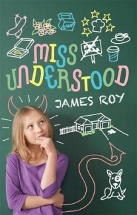Miss Understood by James Roy

Woolshed Press, 2012. ISBN 9781864718607.
(Ages: 10 +) Recommended. Family and humour. Poor Lizzie. No one
understands her, she sometimes speaks in riddles, often takes people
literally, and tries to help where help is not needed. On one such
day, one in a long line of such days, she ends up setting fire to
the headmaster's portrait and so is asked to leave her school, Our
Lady of the Sacred Wimple. In this winning first person narrative
story, Lizzie becomes home schooled by her mother, and through her
eyes we see that things at home are not as she would like them to
be. Dad is a food writer and some of his reviews have almost ended
in litigation, and Lizzie has found him in tears in his study. The
arguments are becoming more frequent and things are happening to
upset the household.
Their house is one in a cul-de-sac, where display homes are often open
for people to look through. As theirs was once one, they often have
people peering through their windows or just walking in, increasing
Dad's temper outbursts. The empty house next door intrigues Lizzie
as she has discovered that sometimes there is a light left on and
she hears noises. There are pizza boxes in their bin, and the older
woman across the road asks odd questions. Lizzie is working at the
Helping Hand Centre with Miss Huntley and so hears tales of people
helping others through her community service, being done to increase
the possibility of returning to her school.
All of these combine to make a sharply observed inviting story about
a young girl noticing things in her environment, but unsure what
they all mean. The neat parallel of the model homes with the
example of these less than model families, is a strong theme in this
wonderful story as Elizabeth comes to realise that her father is
depressed, and that the man living next door has a similar condition
following his marriage break down. Of course, she tries to help both
men, and the pamphlet given to her father, she passes on to the man
next door. But in the end, the greatest help she gives her father is
being herself.
It is always good to see a novel where families are represented with
all their faults, and trying hard to retain its equilibrium. James
Roy has a knack of presenting families truthfully, and could easily
be compared with those books from the pen of Simon French,
Jacqueline Wilson and others.
Fran Knight